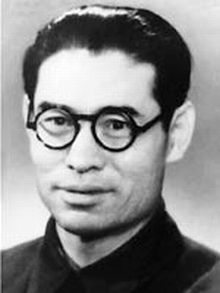| Gao Gang | |||||||||
|---|---|---|---|---|---|---|---|---|---|
 | |||||||||
| Traditional Chinese | 高崗 | ||||||||
| Simplified Chinese | 高岗 | ||||||||
| |||||||||
Gao Gang (Chinese: 高岗; Wade–Giles: Kao Kang; 1905 – August 1954) was a Chinese Communist Party (CCP) leader during the Chinese Civil War and the early years of the People's Republic of China (PRC) before he became the victim of the first major purge within the party since before 1949. The events surrounding Gao's purge, the so-called "Gao Gang Affair", are still the subject of debate: a limited amount of research has been done on the topic, partly because of the relatively small amount of information available.
Born in rural Shaanxi province in 1905, Gao Gang joined the party in 1926 and led a revolutionary guerrilla base there during the Chinese Civil War.[1] He was of peasant background with a low level of education: he is said to have not been very literate.[2][3] Among his colleagues in the party, he gained a reputation as having great confidence and ambition, as well as of being a womanizer.[4] Trusted by Mao Zedong, Gao was dramatically promoted in the final years of the civil war to become the party state and military head of Manchuria, the key Northeast area of China. In 1952, he was ordered to Beijing to become head of the State Planning Commission of China (SPC), where he later attempted a leadership challenge against Liu Shaoqi and Zhou Enlai.[5] His attempt failed and he committed suicide in August 1954.[6]
- ^ Witold Rodzinski, The People's Republic of China: A Concise Political History (New York, 1988), p. 39.
- ^ Kenneth Lieberthal, Governing China: From Revolution Through Reform (New York, 1995) p. 96.
- ^ Frederick C. Teiwes, Politics At Mao's Court: Gao Gang and Party Factionalism in the Early 1950s (New York, 1990) pp. 36–37.
- ^ Cite error: The named reference
BY165was invoked but never defined (see the help page). - ^ Kenneth Lieberthal, Governing China: From Revolution Through Reform (New York, 1995) p. 97.
- ^ Frederick C. Teiwes, Politics At Mao's Court: Gao Gang and Party Factionalism in the Early 1950s (New York, 1990) p. 129.